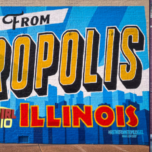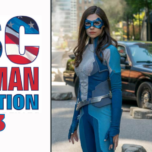In this topical episode, Morgan Glennon and Rebecca Johnson are joined by Supergirl Radio Legal Consultants, Leslie and Susan, to discuss the intricacies of Kara Zor-El’s Refugee Status and the Alien Amnesty Act.
If you’d like to help Supergirl Radio win a Podcast Award, create an account at PodcastAwards.com and nominate us for the People’s Choice and TV & Film categories!
You can find Supergirl Radio on:
Social Media: Facebook – Twitter – Instagram
Subscribe: Apple Podcasts – Stitcher Radio – DC TV Podcasts – Google Play – Spotify – Spotify Playlist – iHeartRadio – Radio Public – Podchaser
Contact: [email protected]
Podcast: Play in new window | Download
Subscribe: Apple Podcasts | RSS






I wanted to also point out that when Kara Zor-El addressed the Argo City High Council in Dark Side of the Moon in Season 3, Episode 20, she referenced herself as an “alien immigrant” not as a “refugee.”
great episode! I’m far from an expert in this area, but Rebecca and Morgan’s comments throughout the season on this matter, along with this episode itself, have been quite enlightening. So, thank you for that.
However, I was wondering, based on what you all had to say about Kara’s status, how that information would apply to the other main aliens in this series. (J’onn, Mon-El when he was around, Brainy, and Nia, as far as series regulars go, and you could add others such as President Marsdin, M’Gann, Brian the Alien, and J’onn’s father just to name a few.) How would one determine their statuses, and (for J’onn and Brainy, as well as arguably Mon-El) what effect does that have on their jobs at the DEO? Would they be allowed to work there if that organization existed in the real world?
I know that’s probably not easy to answer, but I would welcome any opportunity to shine light on this subject, as it’s one I’ve been wondering about for a while. Thank you.
We thought that J’onn for sure would qualify as a refugee, assuming aliens were afforded the same rights as humans pursuant to the Alien Amnesty Act. J’onn escaped Mars because the White Martians and Green Martians were at war and the White Martians persecuted and killed off most of the Green Martians. My’rnn and M’gann might similarly qualify for refugee status.
Other aliens who could possibly qualify for refugee status are
— President Olivia Marsdin as a Durlan who escaped a war on her planet after it was invaded
— Lyra Strayd, a Valerian, who was Winn’s girlfriend in Season 2, left Starhaven because of a 10-year war
–Marcus, his mother, and the other Phorians in Season 2, City of Lost Children, who were persecuted on several different planets prior to coming to Earth
— Brainy perhaps because he faces persecution in the future so he can’t go home.
–Mon-el because other Daxamites might think of him as a traitor to his people
I wonder if Vito Andolini (later named Corleone) in The Godfather: Part II qualifies as both a refugee and an immigrant?
Because I saw the Godfather movies once years ago, I looked up Vito Andolini on wikipedia.
According to wikipedia, Marlon Brando’s character, Vito Andolini, whose name was changed to Vito Corleone, was born in Corleone, Sicily. Vito immigrated to the U.S. when both his parents were murdered. These same forces also wanted to kill him as a ten-year old boy. Vito, therefore could not return to Sicily. Consequently, Vito could qualify as both an immigrant and refugee by today’s definition of these terms. The immigration laws at the beginning of the 20th century, however, were vastly different than they are now.
Leslie